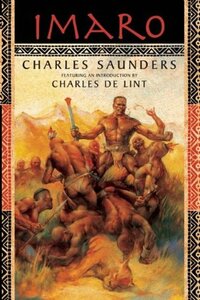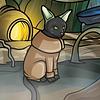Take a photo of a barcode or cover
adventurous
dark
tense
fast-paced
Plot or Character Driven:
Plot
Strong character development:
Yes
Loveable characters:
No
Diverse cast of characters:
No
Flaws of characters a main focus:
Yes
adventurous
dark
medium-paced
Plot or Character Driven:
A mix
Strong character development:
Yes
Loveable characters:
No
Diverse cast of characters:
No
Flaws of characters a main focus:
Yes
Wild how Robert E. Howard's Conan cooked two very different people's brains in a very similar way. From the episodic short tales of Howard's Cimmerian attempting (and excelling at) everything the Hyborian Age would throw his way, both John Milius and Charles R. Saunders distilled a sword & sorcery bildungsroman. How does such a powerful figure come to be and what youth trauma shaped him, for surely there must have been one? (There was none in the original Conan texts.)
Imaro certainly treads the world beneath his sandaled feet, but between gigantic melancholies and gigantic mirths he far more often displays the former. Which is not to say Imaro is a drip: he is understandably detached from society after everything that befalls him until he eventually wrests a semblance of control over his circumstances.
Speaking of society: there is not a single city in these 300 pages! Saunders shows us herder life, jungle village life, bandit life, but the civilizations of the Eastern Nyumbani coast are far away - only represented thru military forces come to suppress the haramia that has become a thorn in their sides.
Haramia? Excuse me, that is the term for a group of bandits preying the savannah (I mean the tumburare); Saunders' skill is such that he throws dozens of bullshit fantasy terms at you with such a steady, measured pace that you won't even require the glossary that's included at the end of the book. At least, I didn't!
Women! Always a hot button issue to watch out for when reading the genre, so how does Imaro fare? This is still a young man's book, and women are mostly the protagonist's mom and the hot women who want to fuck him (and are killed or in need of saving), but I feel that there is a seed of possibility there - Imaro ponders the unfairness of the Ilyassai's polygamous arrangements where only men may have multiple wives. Tanisha's, uh, Jacob Black style imprinting on Imaro is a weird shorthand for getting her to like him, but I suppose it's an attempt at making her culture seem alien and magical? She could have just fallen for him! He's cool and helps her! Wouldn't have required much of a rewrite!
The "sorcery" part is very horror-infused, to the point where I'm not sure I've read many sword & sorcery stories where every single wizard is absolutely repellent to this extent. Saunders basically trains you to recoil at seeing the word "m'chawi" pop up in the prose.
Kind of a shame this ends on such a cliffhanger (I understand previous editions didn't), cuz I've got many a gap to plug, series and authors to start, but I'm very tempted to just start on the second book right away.
Imaro certainly treads the world beneath his sandaled feet, but between gigantic melancholies and gigantic mirths he far more often displays the former. Which is not to say Imaro is a drip: he is understandably detached from society after everything that befalls him until he eventually wrests a semblance of control over his circumstances.
Speaking of society: there is not a single city in these 300 pages! Saunders shows us herder life, jungle village life, bandit life, but the civilizations of the Eastern Nyumbani coast are far away - only represented thru military forces come to suppress the haramia that has become a thorn in their sides.
Haramia? Excuse me, that is the term for a group of bandits preying the savannah (I mean the tumburare); Saunders' skill is such that he throws dozens of bullshit fantasy terms at you with such a steady, measured pace that you won't even require the glossary that's included at the end of the book. At least, I didn't!
Women! Always a hot button issue to watch out for when reading the genre, so how does Imaro fare? This is still a young man's book, and women are mostly the protagonist's mom and the hot women who want to fuck him (and are killed or in need of saving), but I feel that there is a seed of possibility there - Imaro ponders the unfairness of the Ilyassai's polygamous arrangements where only men may have multiple wives. Tanisha's, uh, Jacob Black style imprinting on Imaro is a weird shorthand for getting her to like him, but I suppose it's an attempt at making her culture seem alien and magical? She could have just fallen for him! He's cool and helps her! Wouldn't have required much of a rewrite!
The "sorcery" part is very horror-infused, to the point where I'm not sure I've read many sword & sorcery stories where every single wizard is absolutely repellent to this extent. Saunders basically trains you to recoil at seeing the word "m'chawi" pop up in the prose.
Kind of a shame this ends on such a cliffhanger (I understand previous editions didn't), cuz I've got many a gap to plug, series and authors to start, but I'm very tempted to just start on the second book right away.
Brilliant.
Imaro's on everyone's "must read" list of Sword-and-Sorcery authors, alongside Robert Howard, Michael Moorcock, Fritz Leiber, and C. L. Moore. He is notable in most of these lists as being one of the first Black authors of S&S fiction (C.L. Moore as cited as holding a similar position vis a vis women, though she was a generation older than Saunders).
The representation matters, especially in a time when it was so scarce, and so I don't want to minimize that. At the same time, I think it's reductive to tokenize his writing as merely paying dues to diversity in S&S, because Saunder's writing is freaking brilliant. Not only is his imagination and capacity for world building equal to all of the authors I described above, but he excels all of them (except maybe Leiber) for crafts, pacing, and character development. I have seldom read an "anthology" of stand-alone episodes paced so much like a novel, and the cliff-hanger ending makes me want to read more in a way that, say, (with apologies to St. Moorcock) your typical Elric story simply does not.
Nyumbani is fully-realized, a mythic Africa as richly imagined and described as Howard's Hyborean Europe (as was very much Saunder's explicit intent). Many of our favorite S&S tropes are here, from the unsullied barbarian of conflicted conscience to the wordly woman trained in the ways of pleasing men (though Tanisha is far less a mere cypher for male desires than most of her contemporary heroines), and the villainy of sorcery (here m'chawi) is potent and omnipresent. But these are not cookie-cutter plots, and Saunders squeezes great suspense and ambiguity out of these tropes. I think it is unfortunate that he was not more celebrated for his achievement. Not only are Imaro and his many companions vivid characters in their own rights, but Saunders did much to establish the versatility and latent possibility in so-called "pulp fantasy."
Imaro's on everyone's "must read" list of Sword-and-Sorcery authors, alongside Robert Howard, Michael Moorcock, Fritz Leiber, and C. L. Moore. He is notable in most of these lists as being one of the first Black authors of S&S fiction (C.L. Moore as cited as holding a similar position vis a vis women, though she was a generation older than Saunders).
The representation matters, especially in a time when it was so scarce, and so I don't want to minimize that. At the same time, I think it's reductive to tokenize his writing as merely paying dues to diversity in S&S, because Saunder's writing is freaking brilliant. Not only is his imagination and capacity for world building equal to all of the authors I described above, but he excels all of them (except maybe Leiber) for crafts, pacing, and character development. I have seldom read an "anthology" of stand-alone episodes paced so much like a novel, and the cliff-hanger ending makes me want to read more in a way that, say, (with apologies to St. Moorcock) your typical Elric story simply does not.
Nyumbani is fully-realized, a mythic Africa as richly imagined and described as Howard's Hyborean Europe (as was very much Saunder's explicit intent). Many of our favorite S&S tropes are here, from the unsullied barbarian of conflicted conscience to the wordly woman trained in the ways of pleasing men (though Tanisha is far less a mere cypher for male desires than most of her contemporary heroines), and the villainy of sorcery (here m'chawi) is potent and omnipresent. But these are not cookie-cutter plots, and Saunders squeezes great suspense and ambiguity out of these tropes. I think it is unfortunate that he was not more celebrated for his achievement. Not only are Imaro and his many companions vivid characters in their own rights, but Saunders did much to establish the versatility and latent possibility in so-called "pulp fantasy."
adventurous
medium-paced
Plot or Character Driven:
A mix
Strong character development:
Complicated
Loveable characters:
Complicated
Diverse cast of characters:
Yes
Flaws of characters a main focus:
Yes
Heard that this is a traditional, classic sword and sorcery fantasy tale written in the 80s, exploring a fantasy world inspired by African culture. It intrigued me, so I listened to it on Audible over a few days. Imaro consists of a number of short stories with the same key character, which loosely link and have some over-arching plot lines. In that way it bears some similarities to The Last Wish, the first instalment in The Witcher books, especially as their is a lot of journeying in this tale as well, with the main focus on one central figure, and a few side characters cropping up a number of times.
It was said to bear similarities with Conan, which I see, but they are not really similar. They both would be considered 'classic sword and sorcery' fantasy, with a warrior as the main character, but the significantly different cultures explored as well as the themes, which are often about a bit of politics and leadership in Imaro make it different and also really interesting as well.
A good listen, with some great moments.
3.5/4 Stars
It was said to bear similarities with Conan, which I see, but they are not really similar. They both would be considered 'classic sword and sorcery' fantasy, with a warrior as the main character, but the significantly different cultures explored as well as the themes, which are often about a bit of politics and leadership in Imaro make it different and also really interesting as well.
A good listen, with some great moments.
3.5/4 Stars
Sword and sorcery high fantasy just doesn’t do it for me anymore, but I always open to being bowled over by an exception to that genre preference. This didn’t do it for me, but I appreciate the effort at world-building.
adventurous
funny
tense
fast-paced
Plot or Character Driven:
A mix
Strong character development:
Yes
Loveable characters:
Yes
Diverse cast of characters:
Complicated
Flaws of characters a main focus:
No
Sword and sworcery story with magic, mythical creatures, and a lot of swordplay. It's a violent fun adventure story with a lot of action set in a mythical ancient African continent.
Love that this exists! Taking the classic fantasy rogue story and viewing it through an African lens. The world is vivid and interesting, and it hits a lot of the same beats as the Conan stories. It takes a while to get familiar with the setting, but it's a fun read for fantasy/adventure fans.
There are pros and cons to this book. For the time in which it was written, it is a lovely slice of the Fantasy genre, unique in its perspective. For this, I really enjoyed it. I like the cultures and peoples that Imaro interacted with. I liked all of the mythos and storytelling in the first section of his tale. But as the book continues, I found that there was less about the different people' cultures and tribes, and more about Imaro's sword-and-sorcery type quest. Fine, I get that, it was just a bit less engaging as the book went on. It's also clear that the few women in the book are dated by the very nature of when the book was written, but what can you do about that? Overall, I'm disappointed that it became 'just another epic quest slog' as it went on but I'm glad a read it.



